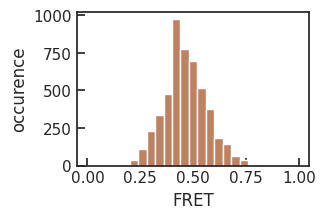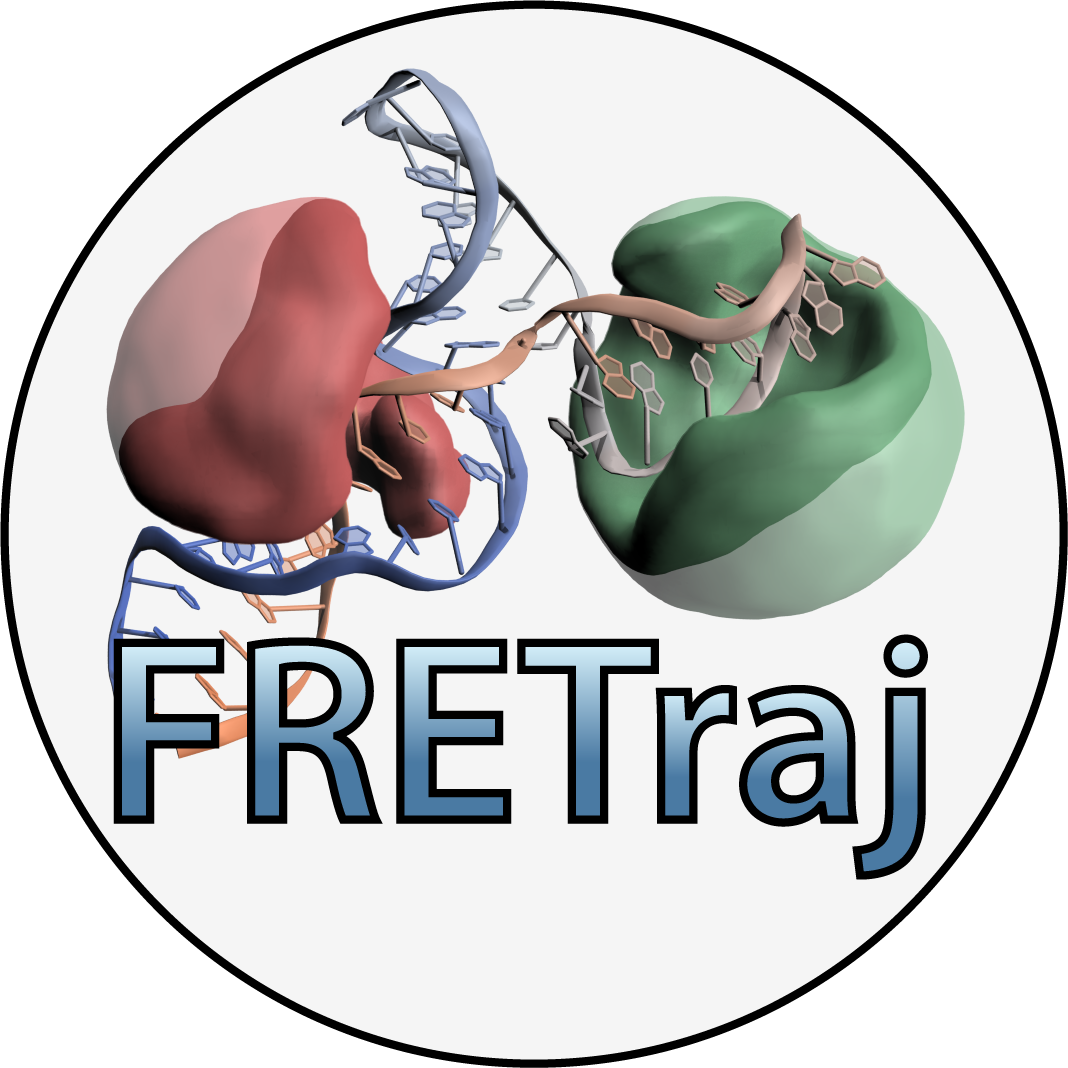Generating photon bursts#
FRETraj predicts mean FRET efficiencies and distributions thereof for dynamic biomolecules as outlined in the previous sections. FRET histograms of single-molecule experiments are often broadened due to shot-noise. For better comparison of in vitro and in silico FRET measurements, FRETraj can take the photon noise into account by simulating fluorescence emission events. The probabilities of donor and acceptor emission are dependent on the quantum yields and fluroescence lifetimes of the dyes as well as the transfer efficiency and thus the distance between their ACVs [6, 7]. This notebook show how to simulate photon bursts similar to a confocal single-molecule experiment.
import fretraj as ft
import pandas as pd
from matplotlib import pyplot as plt
import seaborn as sns
import os
First, we load a parameter file for the burst simulation. The format of this file is described here
parameters = ft.burst.readParameters('burst_data/burst_parameters.json')
parameters
Show code cell output
{'dyes': {'tauD': 1,
'tauA': 1.4,
'QD': 0.2,
'QA': 0.2,
'etaA': 0.3,
'etaD': 0.2,
'dipole_angle_abs_em': 10},
'sampling': {'nbursts': 5000,
'skipframesatstart': 0,
'skipframesatend': 1000,
'multiprocessing': True},
'fret': {'R0': 5.4,
'kappasquare': 0.6666,
'gamma': True,
'quenching_radius': 1},
'species': {'name': ['all'],
'unix_pattern_rkappa': ['R_kappa.dat'],
'probability': [1],
'n_trajectory_splits': None},
'bursts': {'lower_limit': 15,
'upper_limit': 150,
'lambda': -2.3,
'averaging': 'all',
'QY_correction': False,
'burst_size_file': None}}
Importantly, key species.unix_pattern_rkappa in the parameter file points to any file matching the given regular expression. Here, the file R_kappa.dat is created from a ft.cloud.Trajectory object (see Working with Trajectories) and contains inter-dye distance \(R_\text{DA}\)(t) and \(\kappa^2\) values.
pd.read_csv('burst_data/R_kappa.dat', sep='\t', names=['R_DA (nm)', 'kappasquare']).head()
| R_DA (nm) | kappasquare | |
|---|---|---|
| 0.0 | 5.09 | 0.66 |
| 100.0 | 5.12 | 0.66 |
| 200.0 | 5.16 | 0.66 |
| 300.0 | 5.11 | 0.66 |
| 400.0 | 5.38 | 0.66 |
An analytical burst size distribution \(P(x)\) is specified as a power law with a coefficient \(\lambda\)
Here we set the expoenent to \(\lambda=-2.3\). We can now start a burst experiment.
experiment = ft.burst.Experiment('burst_data/', parameters)
Loading files...
Orientation independent R0_const = 5.8 A
donor acceptor
QY 0.20 0.20
tau (ns) 1.00 1.40
k_f (ns^-1) 0.20 0.14
k_ic (ns^-1) 0.80 0.57
Burst averaging method: all
Calculate anisotropy: no
Combining burst...
average FRET efficiency: 0.46 +- 0.10
The resulting FRET histogram is broadened by shot-noise.
with sns.axes_style('ticks'):
set_ticksStyle()
f, ax=plt.subplots(nrows=1, ncols=1, figsize=(3, 2), sharex=True, sharey=True, squeeze=False)
ax[0, 0].hist(experiment.FRETefficiencies, bins=25, range=[0, 1], color=[0.75, 0.51, 0.38])
ax[0, 0].set_xlabel('FRET')
ax[0, 0].set_ylabel('occurence')

Launch Binder 🚀 to interact with this notebook.

